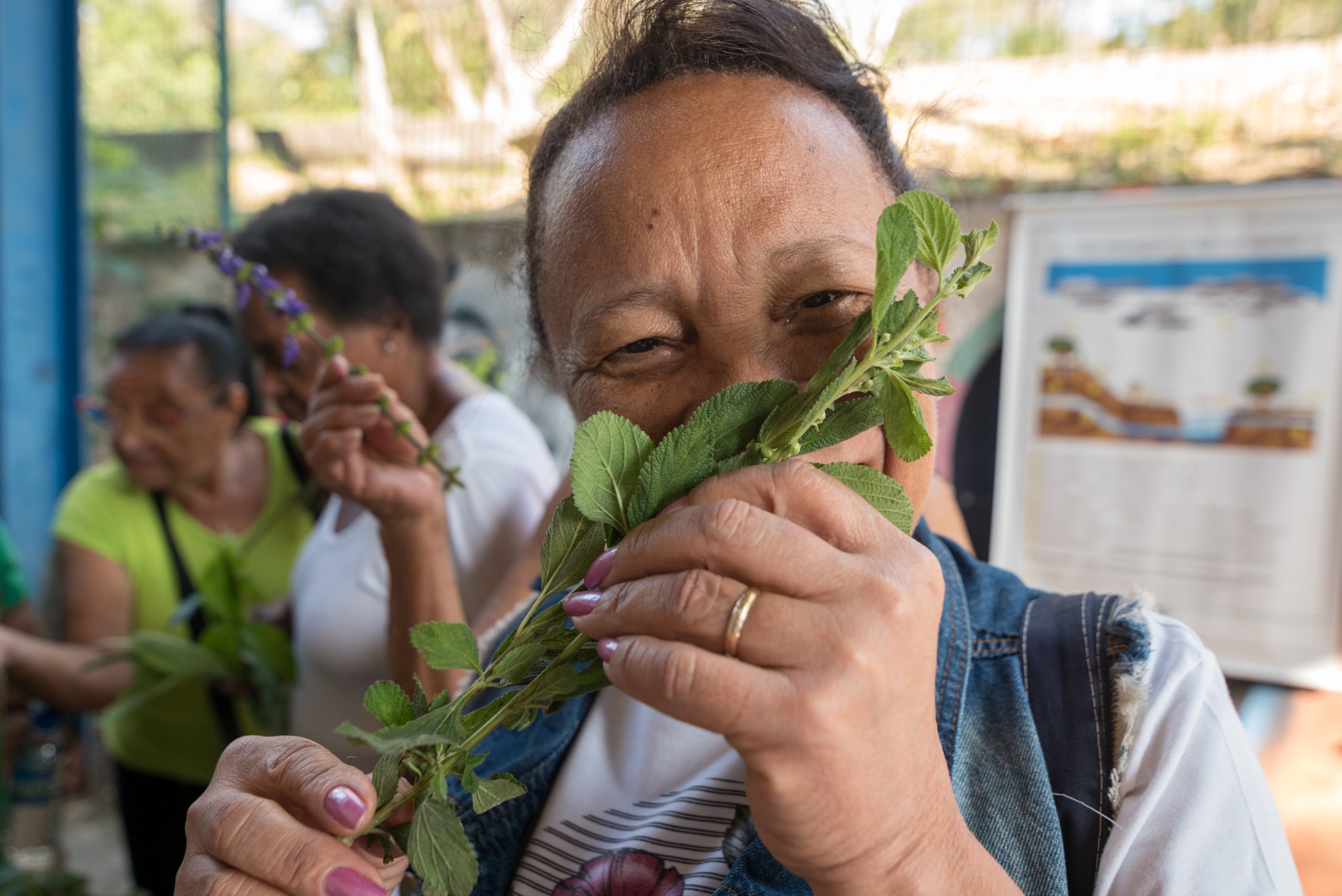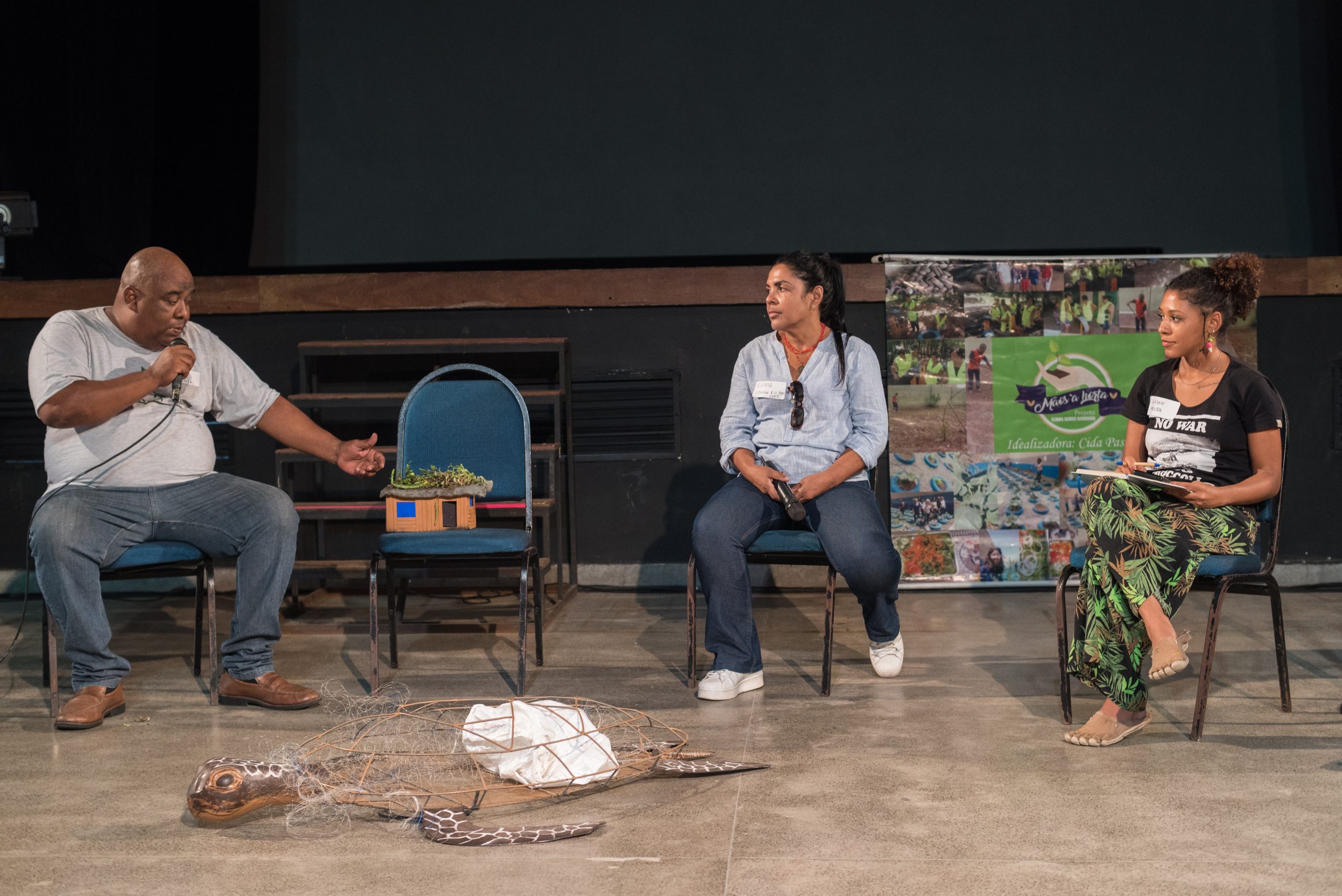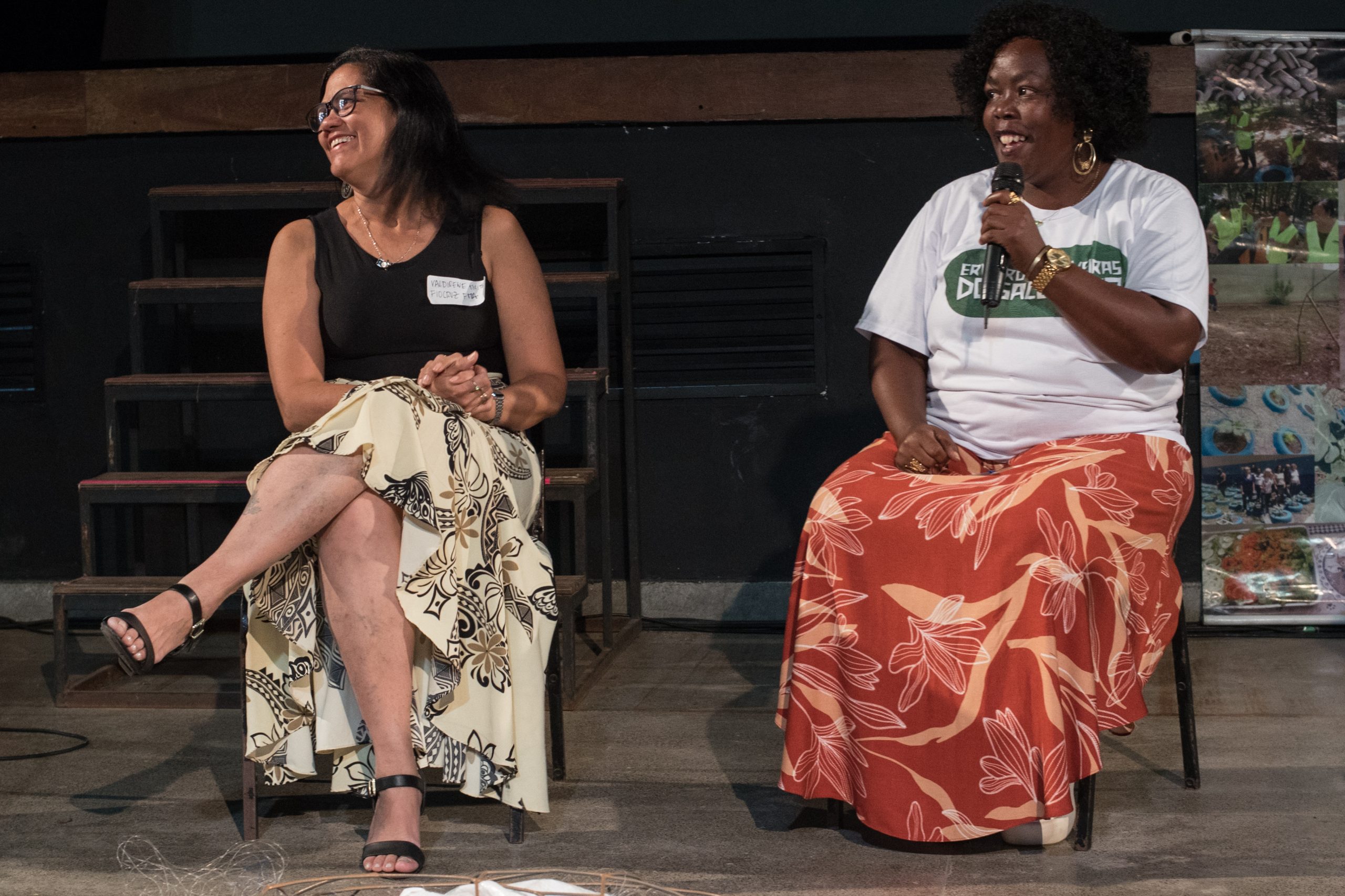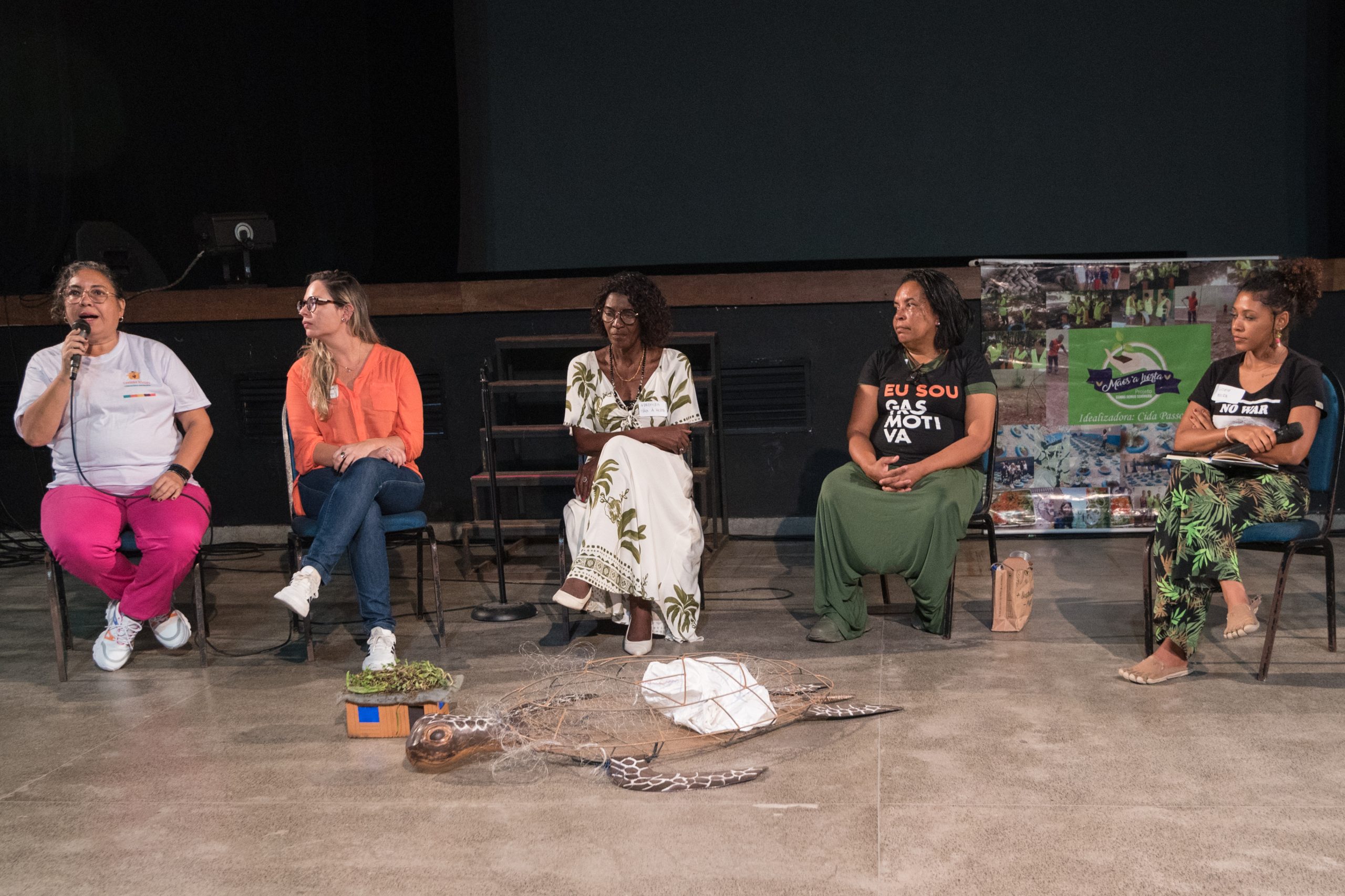
Clique aqui para Português
On August 30, at Arena Dicró in Penha, in Rio de Janeiro’s North Zone, the Sustainable Favela Network’s “Savory Wisdom” roundtable took place, featuring eight community organizers from Greater Rio favelas, all part of the SFN*. The event highlighted experiences spanning the entire food cycle, from planting to consumption, with a focus on food security and food sovereignty in favelas. The panel was part of the closing of Rio de Janeiro’s 13th International Environmental Film Festival (Filmambiente), held since 2011, and showcasing the best of global cinema with a focus on sustainability.
Participating community organizers from the North Zone included: Luis Cassiano from Green Roof Favela in Parque Arará; Valdirene Militão from the Ricardo Barriga Project in the Roquete Pinto favela, in Complexo da Maré, and Fiocruz’s Mata Atlântica program; Claudia Queiroga from Gastromotiva in Engenho da Rainha; and Patrícia Ramalho from Redes da Maré‘s Health Axis and Maré Flavors project. The Central and South Zones were represented by Silvania da Silva from Salgueiro’s Herb Growers’ collective, and Evânia de Paula from Vidigal with her Design and Living Well project. Also present were Anna Paula Salles, founder of A.M.I.G.A.S., a women’s association from the favela of Engenho, in the municipality of Itaguaí, and Aparecida Passos from the Hands to Work Institute, in the municipality of Mesquita, both part of Greater Rio’s Baixada Fluminense region.

The event began with opening words from Gisele Moura, coordinator of the Sustainable Favela Network’s management team. She thanked Filmambiente for the invitation, Arena Dicró for providing space for the event, and AS-PTA Family Farming and Agroecology for supporting the recent documentation of work carried out by the SFN’s Food Sovereignty working group.
“The Sustainable Favela Network is a wide-ranging mobilization of community organizers and technical allies. We are 700 people gathered in a network, representing over 300 favelas that, together, are fighting and advocating for climate justice and socio-environmental resilience in the favelas of Greater Rio.” — Gisele Moura
Panel 1: Water, Soil, Planting, and Community Gardens
The first panel began with a talk by Luis Cassiano, a resident of Parque Arará, who has implemented an impressive green roof on his home. In his presentation, he discussed what this technology entails and how it has successfully reduced the temperature inside his house, making the space healthier and more comfortable.
“In Arará, it’s really hot. Super hot. The favela has no more space, no land left for anything. Now, the favela grows upward. I have a five-story house, and on the top floor, I have a green roof.” — Luis Cassiano
Cassiano spoke about the possibility of using the green roof as a space for planting various edible plants and those with medicinal or therapeutic uses. Additionally, he highlighted that the green roof is an alternative that can be applied in small spaces, such as balconies and to cover rooftop water tanks, keeping water cooler.
“Then, you might ask: but what about food sovereignty? Can you grow food on the green roof? Well, I can’t grow a full vegetable garden. Because, let’s say, lettuce or kale need deeper soil to take root. But I have other things that are edible… like prickly pear… even its fruit is edible. I have plenty of aloe vera. There are some medicinal herbs. Kalanchoe grows well… In addition, on the floor below, the fourth floor of my house, I have a balcony full of plants. And now I’m transitioning to actually growing food there. So, I have my little kale plants, my little lettuce plants. There’s also a lot of fruit trees.” — Luis Cassiano

Evânia de Paula, born and raised in the Vidigal community, a visual artist and PhD candidate at PUC-Rio, shared her insights on the Design and Living Well project.
“It’s design that speaks to a sustainable way of life. As Cassiano was saying, we as human beings have a biocentric need to be in contact with nature… And the work of design, of the visual artist, must be sustainable. My community has grown vertically and has little nature, few green spaces. Vidigal has been affected by concrete; everything is paved over!” — Evânia de Paula
She spoke about how her partnerships with community groups ONG Horizonte and Comunidade Recicla, allow her to hold art workshops and develop a community garden.
“In our community, Comlurb [garbage utility] doesn’t collect all the trash, and what they don’t collect, the community throws down the hillside. As a result, the hillside was full of trash, and the Comunidade Recicla project cleaned up the area and removed it. Now, in one of those spots, we’re developing a community garden.” — Evânia de Paula
As the trash was being removed from the hillsides of Vidigal, she was inspired to create a work of art.
“I saw a turtle being rescued from the sea, dead. So, I created this piece to inspire us to reflect on what we do with our trash. Where does our trash go? We need to think about that!” — Evânia de Paula
Panel 2: Edible Herbs, Agroecology and Zero Waste
Silvania da Silva, an herbalist from Salgueiro, began her talk by emphasizing her journey, which is an ancestral continuation of the work her grandmother did with herbs.
“I was raised on watercress syrup, with everyday health practices. It was with watercress syrup that my grandmother raised me. Over time, [this ancestral technology] has been lost. So, our group works on rescuing and preserving the traditions of food, herbs, and spiritual practices as well. This work holds huge meaning for me.” — Silvania da Silva
In addition to her work with medicinal and spiritual herbs, da Silva also works with the municipal community garden program Hortas Cariocas.
“We have Hortas Cariocas in Salgueiro, which is extremely important because it produces the food that is distributed to the Bombeiro Geraldo Dias School. That’s where I went to school, where my aunt went to school, and my dad went to school… it’s part of our community’s heritage. So, our garden produces, delivers to the school, and distributes [food] to the residents as well.” — Silvania da Silva

Valdirene Militão, from the Ricardo Barriga Project, spoke about community gardens as a means of producing healthy food and promoting well-being.
“When we talk about setting up a vegetable garden, we’re talking about health. We’re generating our own food, planting fruit, herbs, greens, and vegetables without pesticides.” — Valdirene Militão
Militão also spoke about her rooftop garden, which creates a green space within Complexo da Maré. According to her, it is a place where food is grown and harvested, but above all, it is a space of well-being.
“Today, I talk about my garden inside the Maré favela, on the fourth floor [of the building where I live]. What does my green rooftop terrace mean for the neighborhood? When we talk about well-being, I use my son as an example. During the pandemic, he said: ‘I’m going to the rooftop, I’m going to my mom’s garden because that’s where I find peace, that’s where I feel good.’ So, gardens are about more than just food.” — Valdirene Militão
Panel 3: Cooking from the Heart, Solidarity and Sustainable Eating
The final panel began with a report from Claudia Queiroga about the solidarity kitchen in Engenho da Rainha. The goal of Gastromotiva is to provide healthy and full meals to socially vulnerable populations.
“I chose to donate meals during the pandemic to socially vulnerable people, people experiencing homelessness… In dealing with people on the streets, you need, first and foremost, to love… It’s not easy; they question us. They want to know why we’re doing this for them. And what I found out was that I needed to give them a bit of love in the form of a meal, a bit of what I learned from my grandmother… I always say that being raised by my grandmother gave me the authority to talk about food. All of us here talk about the importance of the land, water, and food… I seek food as a form of healing.” — Claudia Queiroga

The story of Anna Paula Salles from A.M.I.G.A.S. in Itaguaí is also about a solidarity kitchen. She started with the help of neighbors and close friends: everything is “by us, for us.” Eventually, she won a grant from Gastromotiva and was able to better structure her initiative in the Engenho favela.
“In the midst of the sadness and the number of infections and deaths being tolled on the Covid-19 in Favelas Unified Dashboard… in December 2020, I helped a woman who was severely burned from cooking with alcohol. I saw her situation, her pain, and I couldn’t even give her a basic food basket because she was traumatized by cooking over a fire. I started hearing other stories, visiting other homes where women were cooking with firewood.
And then, out of nowhere, while penniless, with only the will to do something, we created the Itaguaí Solidarity Kitchen through community mobilization. No authorities helped, no deputies, no councilors, no one. It was by us for us. Each woman, each friend, each enemy, donated beans, rice, and that’s how we managed to make the first community soup kitchen.” — Anna Paula Salles
Aparecida Passos from Mesquita’s Hands to Work Institute, in her role as a social advisor, practices active and empathetic listening with women in distress. She developed a community gardening project in collaboration with the Social Assistance Reference Center (CRAS).
“The Hands to the Garden project… [started with] some old tires… I arranged for some lab coats for the women, so they could get involved without dirtying their clothes… Why did we do it at the CRAS? Because they had classes there, since the center is connected to a municipal school. So, naturally, along with these women who had classes… there were children, learning about planting and how they could have a healthy diet.” — Aparecida Passos
Patricia Ramalho shared that the topic of food security at Redes da Maré began a few years ago, based on the demand from mothers of students involved in the project, who were interested in vocational courses. From there, a culinary project was conceived.
“During the project, in the culinary training, the women were also trained in gender issues, citizenship, and human rights. From there, we established the Maré Flavors catering service, which generates work and income for these women. In the end, I don’t know the exact number, but it’s been thousands of women. The catering is exclusively made up of women from Maré.” — Patricia Ramalho
She mentioned that, in addition to professional training for participants, meals are also donated to socially vulnerable families, providing a foundation for further achievements.
“The donation of 500 meals daily to people experiencing homelessness and to families facing food insecurity… This is what everyone here has been saying: food is the first step for people to secure their other rights.” — Patricia Ramalho
The entire event was imbued with a deep and enriching construction of collective wisdom. The community organizers present shared their experiences and discussed solutions to ensure food security and sovereignty in the favelas. Above all, autonomy, sustainability, and health based on ancestral technologies were emphasized as defining features of the favelas.
The strengthening of collective and community actions thrives on listening and sharing knowledge and practices. As the African proverb wisely notes: “If you want to go fast, go alone. If you want to go far, go together.” The Sustainable Favela Network’s Savory Wisdom roundtable not only fostered the exchange of valuable experiences but also propelled the growth and replication of crucial food security and sovereignty projects in the favelas.
Don’t miss the full album by Bárbara Dias on Flickr:
*The Sustainable Favela Network (SFN) and RioOnWatch are both initiatives realized by not-for-profit organization Catalytic Communities (CatComm).
About the author and photographer: Bárbara Dias was born and raised in Bangu, in Rio’s West Zone. She has a degree in Biological Sciences, a master’s in Environmental Education, and has been a public school teacher since 2006. She is a photojournalist and also works with documentary photography. She is a popular communicator for Núcleo Piratininga de Comunicação (NPC) and co-founder of Coletivo Fotoguerrilha.

